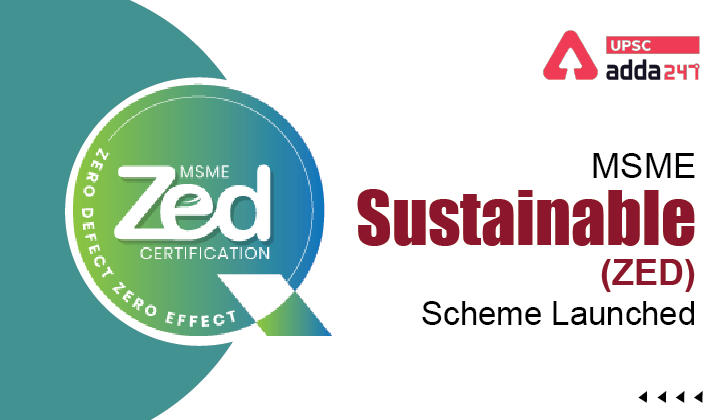Table of Contents
MSME Sustainable Scheme UPSC: Relevance
- GS 3: Indian Economy and issues relating to planning, mobilization, of resources, growth, development and employment.
ZED scheme UPSC: Context
- Recently, Ministry of Micro, Small & Medium Enterprises (MSME) has launched the MSME Sustainable (ZED) Certification Scheme to provide a roadmap to global competitiveness for the MSMEs of India.
MSME Sustainable Scheme: Key points
- The Scheme is an extensive drive to enable and facilitate MSMEs adopt Zero Defect Zero Effect (ZED) practices and motivate and incentivize them for ZED Certification.
- Through the journey of ZED Certification, MSMEs can reduce wastages substantially, increase productivity, enhance environmental consciousness, save energy, optimally use natural resources, expand their markets, etc.
MSME Sustainable Scheme: Key features
- Under the Scheme, MSMEs will get subsidy as per the following structure, on the cost of ZED certification:
- Micro Enterprises: 80%
- Small Enterprises: 60%
- Medium Enterprises: 50%
- Besides, there will be an additional subsidy of 10% for the MSMEs owned by Women/SC/ST Entrepreneurs or MSMEs in NER/Himalayan/LWE/Island territories/aspirational districts.
- Additionally, there will be an additional subsidy of 5% for MSMEs which are also a part of the SFURTI or Micro & Small Enterprises – Cluster Development Programme (MSE-CDP).
- Further, a limited purpose joining reward of Rs. 10,000/- will be offered to each MSME once they take the ZED Pledge.
- A provision of up to 5 lakhs per MSME will be made available for handholding and consultancy support for MSMEs under ZED Certification for assisting them to move towards Zero Defect Zero Effect solutions.
What is Zero defect Zero Effect (ZED) scheme?
- ZED is an MSME certification that was introduced to urge industries, especially MSMEs, to manufacture goods in the country with “Zero Defects” so that the exported goods are never returned due to bad quality.
- Goods that are certified should also ensure that they have “Zero Effect”, which means that the goods shouldn’t have a negative effect on the environment.
- The ZED rating was introduced to enhance the competitiveness and the quality of Indian MSMEs.
- By continuously improving its process, their aim is to move up the maturity assessment model (Bronze – Silver – Gold – Diamond – Platinum).
- The rating is a weighted average of the marks obtained on each parameter.
- The rating provided will be valid for a period of 4 years.
- Surveillance audit will be carried out by the Quality Council of India.
ZED rating
| Score | Ratings |
| 2.2 – 2.5 | Bronze |
| 2.5 – 3.0 | Silver |
| 3.0 – 3.5 | Gold |
| 3.5 – 4.0 | Diamond |
| 4.0 – 5.0 | Platinum |
ZED benefits
- ZED has the potential to become a national movement and that it aims to provide a roadmap to global competitiveness for the MSMEs of India.
- ZED will not only attempt to improve productivity & performance; it has the capability to change the mind-set of manufacturers and make them more environment conscious.
Read current affairs for UPSC





 TSPSC Group 1 Question Paper 2024, Downl...
TSPSC Group 1 Question Paper 2024, Downl...
 TSPSC Group 1 Answer key 2024 Out, Downl...
TSPSC Group 1 Answer key 2024 Out, Downl...
 UPSC Prelims 2024 Question Paper, Downlo...
UPSC Prelims 2024 Question Paper, Downlo...




